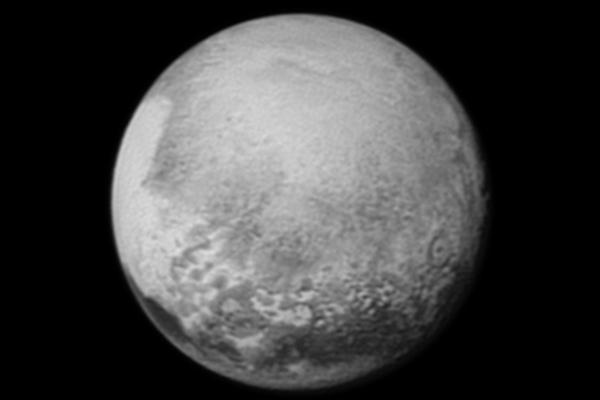New Horizons finds that Pluto is bigger, icier than previously thought


A free daily email with the biggest news stories of the day – and the best features from TheWeek.com
You are now subscribed
Your newsletter sign-up was successful
It turns out that Pluto isn't as small as scientists thought: NASA's New Horizons probe has sent imagery back to Earth showing that the planet's diameter is 1,473 miles (plus or minus 12.4 miles), making it 30 miles wider than the dwarf planet Eris, whose discovery caused Pluto’s demotion from being a full-fledged planet in 2006.
"This settles the debate about the largest object in the Kuiper Belt," New Horizons principal investigator Alan Stern told NBC News. Data sent back from the probe also shows that Pluto has a polar ice cap that is more methane-rich than the dark bands around its equator; that Charon, the largest moon, is 751 miles across; and that the smaller, icy moons Nix and Hydra are just 20 and 30 miles wide, respectively.
New Horizons was launched nine-and-a-half years ago, with the mission to map Pluto and Charon and study Pluto's thin atmosphere. It will make its closest flyby past Pluto on Tuesday morning, but since it will take almost five hours of travel time at the speed of light for the all-clear signal to reach the Earth, scientists won't know if it survived the mission until about 9 p.m. ET. "Tomorrow evening's going to be a little bit of drama," Stern said.
The Week
Escape your echo chamber. Get the facts behind the news, plus analysis from multiple perspectives.

Sign up for The Week's Free Newsletters
From our morning news briefing to a weekly Good News Newsletter, get the best of The Week delivered directly to your inbox.
From our morning news briefing to a weekly Good News Newsletter, get the best of The Week delivered directly to your inbox.
A free daily email with the biggest news stories of the day – and the best features from TheWeek.com
Catherine Garcia has worked as a senior writer at The Week since 2014. Her writing and reporting have appeared in Entertainment Weekly, The New York Times, Wirecutter, NBC News and "The Book of Jezebel," among others. She's a graduate of the University of Redlands and the Columbia University Graduate School of Journalism.
